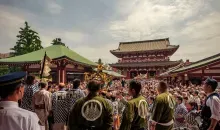Otaku Culture: Passionate Fandom and Creative Participation in Japanese Pop Culture
- Published on : 02/05/2024
- by : J.R.B.
- Youtube
Otaku culture has become a global phenomenon, representing a dedicated and enthusiastic following of various aspects of Japanese pop culture, primarily focused on anime, manga, and video games. The term "otaku" initially carried negative connotations in Japan, associated with obsessive fans perceived as socially awkward. However, over time, the perception of otaku has evolved, and the term is now embraced by many as a celebration of passionate fandom and creative participation in Japanese popular culture.
The Origins and Evolution of Otaku Culture in Japan
Otaku culture traces its roots back to the 1970s and 1980s, coinciding with the rise of manga and anime in Japan. The release of groundbreaking anime series like Mobile Suit Gundam in 1979 marked a critical milestone, attracting a dedicated fan base who appreciated the series' complex storytelling and detailed mecha designs. This hardcore fan following laid the groundwork for what would become known as "otaku."
However, the evolution of otaku culture has been marked by stigma. In the late 1980s, the term took on a more negative meaning due to high-profile criminal cases involving individuals labeled as otaku. The media's portrayal of otaku as socially inept and potentially dangerous further entrenched stereotypes. It wasn't until the late 1990s and early 2000s that the image of otaku began to shift, thanks to the global rise of Japanese popular culture and the international success of anime series like Dragon Ball, Sailor Moon, Pokémon, and Naruto.
Defining Characteristics of Otaku: Passion, Knowledge and Creativity
Otaku are characterized by their deep passion for their chosen interests, whether it be anime, manga, video games, or other aspects of Japanese pop culture. They possess extensive knowledge about their favorite series, characters, and creators, often engaging in in-depth discussions and analysis within fan communities.
Moreover, otaku are known for their creativity and participatory nature. They actively contribute to fan culture through various forms of expression, such as cosplay, fan art, fan fiction, and even the creation of doujinshi (self-published manga). This blurring of lines between consumers and creators is a defining feature of otaku culture.
Negative Stereotypes and Perceptions of Otaku in Japanese Society
Despite the growing acceptance of otaku culture, negative stereotypes persist in Japanese society. Otaku have been portrayed as socially awkward, obsessive, and disconnected from reality. These perceptions were fueled by high-profile criminal cases in the late 1980s and early 1990s, where the perpetrators were labeled as otaku by the media.
The 1991 anime film Otaku no Video further perpetuated negative stereotypes, reinforcing the image of otaku as socially inept and obsessed with manga and anime. While intended as a parody, the film contributed to the stigmatization of otaku in mainstream Japanese society.
The Economic and Cultural Impact of Otaku in Japan
Otaku culture has had a significant economic impact on Japan. The intense dedication of otaku to their hobbies translates into substantial consumer spending on related products, such as DVDs, manga, video games, figurines, and other merchandise. This consumption fuels a significant portion of the Japanese entertainment industry.
Additionally, otaku culture has contributed to tourism in Japan, with areas like Akihabara in Tokyo becoming major attractions for otaku worldwide. The Japanese government has recognized the potential of anime and manga-related tourism, often referred to as "contents tourism," as a significant economic driver.
The economic impact of otaku culture extends beyond Japan's borders. The global anime market was valued at over $20 billion in 2018 and continues to grow, demonstrating the international appeal and willingness of fans to spend money on related products.
The Global Spread and Influence of Otaku Culture
Otaku culture has spread globally, driven largely by the international popularity of anime and manga. Japanese anime and manga have amassed dedicated fan bases in countries around the world, with popular series like Naruto, Dragon Ball, One Piece, and Attack on Titan being translated into multiple languages and aired in dozens of countries.
The global influence of otaku culture is evident in the proliferation of anime conventions, both in Japan and internationally. Events like Comiket in Tokyo, Anime Expo in Los Angeles, and Japan Expo in France showcase the widespread appeal of Japanese pop culture and provide platforms for fans to connect, share their passions, and celebrate their fandom.
Moreover, otaku culture facilitates cultural exchange, introducing people worldwide to Japanese customs, values, and societal issues. For many international fans, anime and manga serve as gateway into broader interest in Japanese culture.
Otaku Subcultures: Anime, Manga, Gaming, Idols, and More
While often viewed as a monolithic entity, otaku culture encompasses diverse subcultures based on specific interests and hobbies. These subcultures demonstrate the wide scope and varied nature of otaku fandom.
Anime and manga otaku are perhaps the most recognized, passionately following Japanese animated series and comics. They often collect related merchandise, attend conventions, and engage in activities like fan art and fan fiction. Popular and influential anime series like Neon Genesis Evangelion, Attack on Titan, and One Piece owe much of their success to dedicated otaku audiences.
Gaming otaku, also known as "gamers," are devoted to video games, particularly those developed in Japan such as the Final Fantasy and Pokémon series. Cosplay otaku engage in the art of dressing up as their favorite characters from anime, manga, video games, and other media, often gathering at conventions to showcase their intricate costumes and connect with fellow fans.
Idol otaku, known as "wota" in Japan, are enthusiastic followers of Japanese pop idol groups like AKB48 or Nogizaka46. Their fandom activities range from attending live performances to collecting merchandise and participating in meet-and-greet events.
Other notable subcultures include train otaku (densha otaku), who are fascinated by trains, and military otaku, who have a deep interest in military hardware, history, and strategy. Each subculture has its own unique characteristics, customs, and communities, contributing to the rich tapestry of otaku culture as a whole.
Famous Examples of Otaku Culture in Media and Events
Otaku culture has left an indelible mark on Japanese popular culture, shaping various forms of media and events. One prime example is the Comiket convention in Tokyo, one of the world's largest self-published comic book fairs. Comiket serves as a major platform for fans to connect, share their work, and celebrate their fandom.
The Akihabara district in Tokyo, often called "Akiba," is another testament to the influence of otaku culture. Known as the "mecca" of otaku, Akihabara is famous for its vast stores selling anime, manga, video games, electronics, and other otaku-related goods. The district has become a significant tourist attraction, drawing otaku from around the globe.
In media, anime series like Otaku no Video, Genshiken, and Welcome to the N.H.K. have explored and parodied otaku culture, offering insights into the subculture's intricacies and challenges. The light novel and anime series Oreimo (My Little Sister Can't Be This Cute) also delves into the life of an otaku and the dynamics of hiding one's interests from others.
Criticisms and Controversies Surrounding Otaku Culture
Despite its growing acceptance and influence, otaku culture has faced criticism and controversy. In Japan, there are concerns that the intense obsession otaku have with their interests, often at the expense of social interaction and traditional societal norms, can lead to escapism and social isolation.
Some critics argue that otaku culture excessively sexualizes female characters, reinforcing problematic gender stereotypes. Outside of Japan, while many appreciate the unique creativity and storytelling found in anime and manga, otaku culture can be misunderstood or stereotyped, resulting in an oversimplified view of Japanese culture as a whole.
There are also criticisms concerning cultural appropriation and the lack of cultural context in the foreign consumption and production of otaku-related media. These concerns highlight the need for respectful engagement with Japanese culture and an understanding of the complexities and nuances within otaku culture itself.
While otaku culture has become a prominent part of global pop culture, it also invites important conversations about societal norms, representation, and cultural understanding. As otaku culture continues to evolve and spread, it is crucial to approach it with sensitivity, respect, and an open mind.




































